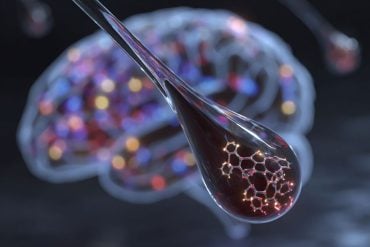Summary: New research suggests that out-of-body experiences (OBEs) may serve as coping mechanisms triggered by trauma, rather than symptoms of mental illness. Based on data from over 500 individuals, those who had OBEs reported higher rates of mental health conditions, but also described lasting benefits from their experiences.
Many participants reported reduced fear of death, greater inner peace, and a broader sense of existence following an OBE. These findings challenge stigma and call for more compassionate clinical approaches to OBEs.
Key Facts:
- Coping Mechanism: OBEs may represent dissociation in response to trauma or emotional pain.
- Reported Benefits: Many experiencers say OBEs reduced their fear of death and improved their outlook.
- Stigma Challenge: The findings encourage a shift in clinical and public perception toward acceptance.
Source: University of Virginia
Out-of-body experiences – where people feel like spirits disconnected from their physical form – may be a coping mechanism triggered by trauma or other overwhelming stress, new University of Virginia School of Medicine research suggests.
That idea challenges the common assumption that out-of-body experiences, or OBEs, are solely a symptom of mental illness. Based on data from more than 500 people, the researchers, including UVA Health’s Marina Weiler, PhD, instead argue for a more nuanced perspective: that OBEs may represent an underlying issue that could be a better treatment target than the out-of-body experiences themselves.

“Many people believe that having OBEs means there’s something wrong with them, so they often keep it to themselves out of fear of being judged or seen as mentally ill. Unfortunately, many mental health professionals still view these experiences in the same way,” said Weiler, a neuroscientist with UVA’s Division of Perceptual Studies.
“In this work, we found that individuals who have had OBEs tend to report poorer mental health compared to those who have not. However, our findings also suggest that OBEs may function as a coping mechanism in response to past trauma, rather than serving as a cause of mental illness. We encourage mental health practitioners to reconsider the way they interpret these experiences and to approach them with greater openness and sensitivity.”
Understanding Out-of-Body Experiences
The researchers note that many people who report OBEs actually consider them beneficial: One study found that 55% of experiencers said their life was changed, and 71% found the OBE of lasting benefit.
A substantial 40% described it as the greatest thing that had ever happened to them. Further, many experiencers find themselves less afraid of death, report more inner peace and say they are more open to new ideas about the nature of existence.
To better understand OBEs, Weiler and her colleagues collected data from people 18 and older online, asking them both if they were certain they had undergone an OBE and about their medical history, including their mental health history.
The average age of first reported out-of-body experience was young, often occurring in childhood. Among experiencers, 80% reported one to four experiences, while the remaining 20% reported five or more.
The OBEs were described as spontaneous by 74%, while 9% of respondents said they were using psychoactive compounds, and 8.2% said the OBEs were self-induced by meditation, visualization, or other means. Hypnosis was reported by 0.7%.
The scientists found that the OBE experiencers were more frequently diagnosed with mental health conditions than those who had not had an OBE. Further, the longer since the first OBE, the more likely the OBErs were to have been diagnosed with a mental health disorder.
Weiler and her colleagues, however, propose that the OBEs themselves may not be the issue. Instead, out-of-body experiences may represent the experiencers’ subconscious attempts to distance themselves from grief or trauma or other “distressing realities.”
They found high levels of childhood trauma in the OBE group, suggesting that OBEs may be a “dissociative response to overwhelming stress or emotional pain.”
“This view,” the researchers write in a new scientific paper, “shifts the focus from causation to the possibility that OBEs may also emerge as a consequence, a coping strategy for navigating difficult or traumatic experiences.”
Based on their findings, the researchers are urging further research to explore the potential implications for the mental health treatment that experiencers receive.
“If OBEs are understood not as symptoms of pathology but as coping mechanisms – especially in response to trauma – this reframing can lead to several important shifts in clinical practice, research and public understanding,” Weiler said.
“Ultimately, we hope to reduce the stigma around this topic, encourage help-seeking and build community and resilience among experiencers.”
About this OBE, trauma, and psychology research news
Author: Josh Barney
Source: University of Virginia
Contact: Josh Barney – University of Virginia
Image: The image is credited to Neuroscience News
Original Research: Open access.
“Are out-of-body experiences indicative of an underlying psychopathology?” by Marina Weiler et al. Personality and Individual Differences
Abstract
Are out-of-body experiences indicative of an underlying psychopathology?
Out-of-body experiences (OBEs) are intriguing phenomena where individuals feel detached from their physical bodies.
While OBEs bear a resemblance to manifestations found in neuropsychiatric conditions, the relationship between OBEs and such disorders remains complex and uncertain.
Some studies have demonstrated an association between OBEs and neuropsychiatric conditions, while others suggest potential positive outcomes associated with OBEs.
Consequently, it is crucial to differentiate between non-pathological OBEs and those that may be indicative of underlying psychopathology.
This study aimed to examine the clinical characteristics of OBE experiencers (OBErs), hypothesizing that OBErs did not have inferior mental health compared to non-OBErs.
Contrary to our hypothesis, our findings indicate a significant group difference in psychopathological profile between OBErs and non-OBErs, but the clinical significance of these findings is yet to be elucidated.
To provide a more comprehensive understanding of the potential implications of our findings, we adopt a clinically oriented perspective, examining the nuances of the observed differences and considering their potential relevance to real-world experiences and mental well-being.
We speculate that OBEs may also function as a dissociative coping mechanism rather than a sign of psychopathology, but this claim warrants further investigation.
This reframe invites a broader, more nuanced understanding of OBEs as potentially adaptive responses to stress or trauma, challenging assumptions of a necessary pathologization of the experience.






